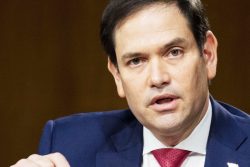(Jamaica Gleaner) Prime Minister Andrew Holness has hit back at critics regarding his decision to appoint the country’s new chief justice in an acting role, declaring that he was from a different age and his way of thinking may not always coincide with those who hold traditional views.
“I was encouraged by the very people who are critical now to take an unconventional view. I followed that view,” said Holness at a press briefing on Friday at the Denham Town Restorative Justice Centre, immediately after touring the zone of special operations in the area along with a delegation from the European Union.
“I interviewed after having gone through a process of shortlisting the chief justice. I have never met the person who I’ve selected as the chief justice. I’ve never had the opportunity to have a conversation with him, I can safely say. I do not know him. I selected someone based upon what is presented on paper as his resume and what I’ve researched as his work and what I have consulted with his peers. It is indeed a break from the traditional and conventional way in which this was done. I am certain that the chief justice understands that I am a person who believes in systems of accountability,” reasoned Holness.
Attorney General Marlene Malahoo Forte announced on Wednesday that Prime Minister Andrew Holness had advised Governor General Sir Patrick Allen to appoint Justice Bryan Sykes to act as chief justice.
Malahoo Forte stated that Justice Sykes is to serve in the position until further advised.
Holness quickly came under fire from the Oppo-sition People’s National Party, which said that the move does not guarantee the independence of the Judiciary from the Execu-tive arm of Government as prescribed by the Constitu-tion.
Some persons in the legal fraternity have questioned Andrew Holness’s decision to appoint Bryan Sykes to act as chief justice.
In a Letter to The Editor of The Gleaner, Jamaica-born Patrick Robinson, who served as a judge at the International Court of Justice in Hague, Nether-lands, said: “The practice of appointing persons to act as judges of the Supreme Court is bad enough, but the appointment of a person to act as the chief judge until the governor general is ‘further advised’ is wholly unacceptable.”
However, Holness maintains that he has no intention of interfering with the independence of the judiciary, arguing that there has to be accountability for the use of taxpayers’ funds.
“We want to see an improvement and strengthening in the rule of law and timely justice outcomes, and the chief justice will be accountable for this. I can’t be any clearer. Those who want to criticise have the luxury of doing it. I have the luxury of running a country and being accountable to the taxpayers for the results of the systems that we are elected to run,” explained Holness.









